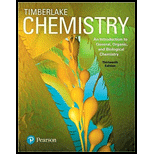
Chemistry: An Introduction to General, Organic, and Biological Chemistry (13th Edition)
13th Edition
ISBN: 9780134421353
Author: Karen C. Timberlake
Publisher: PEARSON
expand_more
expand_more
format_list_bulleted
Concept explainers
Question
Chapter 17.2, Problem 17.15PP
Interpretation Introduction
To determine:
The identity of the
Expert Solution & Answer
Want to see the full answer?
Check out a sample textbook solution
Chapter 17 Solutions
Chemistry: An Introduction to General, Organic, and Biological Chemistry (13th Edition)
Ch. 17.1 - Prob. 17.1PPCh. 17.1 - Prob. 17.2PPCh. 17.1 - Prob. 17.3PPCh. 17.1 - Prob. 17.4PPCh. 17.1 - Prob. 17.5PPCh. 17.1 - Prob. 17.6PPCh. 17.1 - Prob. 17.7PPCh. 17.1 - Prob. 17.8PPCh. 17.1 - State whether each of the following components is...Ch. 17.1 - Prob. 17.10PP
Ch. 17.1 - Prob. 17.11PPCh. 17.1 - Prob. 17.12PPCh. 17.1 - Prob. 17.13PPCh. 17.1 - Prob. 17.14PPCh. 17.2 - Prob. 17.15PPCh. 17.2 - Prob. 17.16PPCh. 17.2 - Prob. 17.17PPCh. 17.2 - 17.18 What component in the backbone of a nucleic...Ch. 17.2 - Prob. 17.19PPCh. 17.2 - Prob. 17.20PPCh. 17.2 - Prob. 17.21PPCh. 17.2 - Prob. 17.22PPCh. 17.3 - List three structural characteristics of DNA.Ch. 17.3 - Prob. 17.24PPCh. 17.3 - Prob. 17.25PPCh. 17.3 - Prob. 17.26PPCh. 17.3 - Write the base sequence in a complementary DNA...Ch. 17.3 - Prob. 17.28PPCh. 17.3 - Prob. 17.29PPCh. 17.3 - Prob. 17.30PPCh. 17.3 - Prob. 17.31PPCh. 17.3 - Prob. 17.32PPCh. 17.4 - Prob. 17.33PPCh. 17.4 - Prob. 17.34PPCh. 17.4 - Prob. 17.35PPCh. 17.4 - Prob. 17.36PPCh. 17.4 - Prob. 17.37PPCh. 17.4 - Prob. 17.38PPCh. 17.4 - Write the corresponding section of mRNA produced...Ch. 17.4 - Write the corresponding section of mRNA produced...Ch. 17.5 - What is a codon?Ch. 17.5 - Prob. 17.42PPCh. 17.5 - Prob. 17.43PPCh. 17.5 - Prob. 17.44PPCh. 17.5 - Prob. 17.45PPCh. 17.5 - Prob. 17.46PPCh. 17.5 - Prob. 17.47PPCh. 17.5 - Why are there at least 20 different tRNAs?Ch. 17.5 - Prob. 17.49PPCh. 17.5 - Where does protein synthesis take place?Ch. 17.5 - Prob. 17.51PPCh. 17.5 - Prob. 17.52PPCh. 17.5 - Prob. 17.53PPCh. 17.5 - Prob. 17.54PPCh. 17.5 - Prob. 17.55PPCh. 17.5 - The following sequence is a portion of the DNA...Ch. 17.5 - The following is a segment of the DNA template...Ch. 17.5 - Prob. 17.58PPCh. 17.6 - Prob. 17.59PPCh. 17.6 - How does a point mutation for an enzyme affect the...Ch. 17.6 - Prob. 17.61PPCh. 17.6 - Prob. 17.62PPCh. 17.6 - How is protein synthesis affected if the normal...Ch. 17.6 - Prob. 17.64PPCh. 17.6 - Prob. 17.65PPCh. 17.6 - Prob. 17.66PPCh. 17.6 - Prob. 17.67PPCh. 17.6 - Prob. 17.68PPCh. 17.7 - Why are E. coil bacteria used in recombinant DNA...Ch. 17.7 - Prob. 17.70PPCh. 17.7 - Prob. 17.71PPCh. 17.7 - Prob. 17.72PPCh. 17.7 - Prob. 17.73PPCh. 17.7 - 17.74 What beneficial proteins are produced from...Ch. 17.7 - Prob. 17.75PPCh. 17.7 - Prob. 17.76PPCh. 17.8 - Prob. 17.77PPCh. 17.8 - Prob. 17.78PPCh. 17.8 - Prob. 17.79PPCh. 17.8 - Prob. 17.80PPCh. 17.8 - Prob. 17.81PPCh. 17.8 - Prob. 17.82PPCh. 17.8 - Prob. 17.83PPCh. 17.8 - Prob. 17.84PPCh. 17.8 - Prob. 17.85PPCh. 17.8 - Prob. 17.86PPCh. 17.8 - Prob. 17.87PPCh. 17.8 - The following is a segment of the template strand...Ch. 17 - Prob. 17.89UTCCh. 17 - Suppose a mutation occurs in the DNA section in...Ch. 17 - Prob. 17.91APPCh. 17 - Prob. 17.92APPCh. 17 - Prob. 17.93APPCh. 17 - Prob. 17.94APPCh. 17 - Prob. 17.95APPCh. 17 - Prob. 17.96APPCh. 17 - Prob. 17.97APPCh. 17 - Prob. 17.98APPCh. 17 - Prob. 17.99APPCh. 17 - Prob. 17.100APPCh. 17 - Prob. 17.101APPCh. 17 - Prob. 17.102APPCh. 17 - Prob. 17.103APPCh. 17 - Prob. 17.104APPCh. 17 - Prob. 17.105APPCh. 17 - Prob. 17.106APPCh. 17 - Prob. 17.107APPCh. 17 - Prob. 17.108APPCh. 17 - Prob. 17.109APPCh. 17 - Prob. 17.110APPCh. 17 - Prob. 17.111APPCh. 17 - Prob. 17.112APPCh. 17 - Prob. 17.113APPCh. 17 - Prob. 17.114APPCh. 17 - Prob. 17.115APPCh. 17 - Prob. 17.116APPCh. 17 - Prob. 17.117CPCh. 17 - A polypeptide contains 36 amino acids. How many...Ch. 17 - Prob. 17.119CPCh. 17 - Prob. 17.120CPCh. 17 - Prob. 17.121CPCh. 17 - Prob. 17.122CP
Knowledge Booster
Learn more about
Need a deep-dive on the concept behind this application? Look no further. Learn more about this topic, chemistry and related others by exploring similar questions and additional content below.Recommended textbooks for you
 ChemistryChemistryISBN:9781305957404Author:Steven S. Zumdahl, Susan A. Zumdahl, Donald J. DeCostePublisher:Cengage Learning
ChemistryChemistryISBN:9781305957404Author:Steven S. Zumdahl, Susan A. Zumdahl, Donald J. DeCostePublisher:Cengage Learning ChemistryChemistryISBN:9781259911156Author:Raymond Chang Dr., Jason Overby ProfessorPublisher:McGraw-Hill Education
ChemistryChemistryISBN:9781259911156Author:Raymond Chang Dr., Jason Overby ProfessorPublisher:McGraw-Hill Education Principles of Instrumental AnalysisChemistryISBN:9781305577213Author:Douglas A. Skoog, F. James Holler, Stanley R. CrouchPublisher:Cengage Learning
Principles of Instrumental AnalysisChemistryISBN:9781305577213Author:Douglas A. Skoog, F. James Holler, Stanley R. CrouchPublisher:Cengage Learning Organic ChemistryChemistryISBN:9780078021558Author:Janice Gorzynski Smith Dr.Publisher:McGraw-Hill Education
Organic ChemistryChemistryISBN:9780078021558Author:Janice Gorzynski Smith Dr.Publisher:McGraw-Hill Education Chemistry: Principles and ReactionsChemistryISBN:9781305079373Author:William L. Masterton, Cecile N. HurleyPublisher:Cengage Learning
Chemistry: Principles and ReactionsChemistryISBN:9781305079373Author:William L. Masterton, Cecile N. HurleyPublisher:Cengage Learning Elementary Principles of Chemical Processes, Bind...ChemistryISBN:9781118431221Author:Richard M. Felder, Ronald W. Rousseau, Lisa G. BullardPublisher:WILEY
Elementary Principles of Chemical Processes, Bind...ChemistryISBN:9781118431221Author:Richard M. Felder, Ronald W. Rousseau, Lisa G. BullardPublisher:WILEY

Chemistry
Chemistry
ISBN:9781305957404
Author:Steven S. Zumdahl, Susan A. Zumdahl, Donald J. DeCoste
Publisher:Cengage Learning

Chemistry
Chemistry
ISBN:9781259911156
Author:Raymond Chang Dr., Jason Overby Professor
Publisher:McGraw-Hill Education

Principles of Instrumental Analysis
Chemistry
ISBN:9781305577213
Author:Douglas A. Skoog, F. James Holler, Stanley R. Crouch
Publisher:Cengage Learning

Organic Chemistry
Chemistry
ISBN:9780078021558
Author:Janice Gorzynski Smith Dr.
Publisher:McGraw-Hill Education

Chemistry: Principles and Reactions
Chemistry
ISBN:9781305079373
Author:William L. Masterton, Cecile N. Hurley
Publisher:Cengage Learning

Elementary Principles of Chemical Processes, Bind...
Chemistry
ISBN:9781118431221
Author:Richard M. Felder, Ronald W. Rousseau, Lisa G. Bullard
Publisher:WILEY
Nucleic acids - DNA and RNA structure; Author: MEDSimplified;https://www.youtube.com/watch?v=0lZRAShqft0;License: Standard YouTube License, CC-BY